Related Research Articles

Biological systematics is the study of the diversification of living forms, both past and present, and the relationships among living things through time. Relationships are visualized as evolutionary trees. Phylogenies have two components: branching order and branch length. Phylogenetic trees of species and higher taxa are used to study the evolution of traits and the distribution of organisms (biogeography). Systematics, in other words, is used to understand the evolutionary history of life on Earth.

The ground tit, Tibetan ground-tit or Hume's ground-tit is a bird of the Tibetan plateau north of the Himalayas. The peculiar appearance confused ornithologists in the past who called it as Hume's groundpecker and still later as Hume's ground jay or Tibetan ground jay assuming that it belonged to the family Corvidae that includes the crows and jays. Although morphologically confusing, the species has since been identified using molecular sequence comparisons as being a member of the tit family (Paridae) and is the only species in the genus Pseudopodoces. It is found in the Tibetan Plateau of China, India, Nepal & Bhutan.
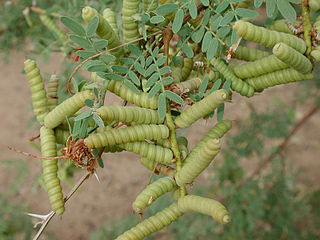
Mesquite is a common name for several plants in the genus Prosopis, which contains over 40 species of small leguminous trees. They are native to the southwestern United States and Mexico. The mesquite originates in the Tamaulipan mezquital ecoregion, in the deserts and xeric shrublands biome, located in the southern United States and northeastern Mexico. It has extremely long roots to seek water from very far under ground. The region covers an area of 141,500 km2, encompassing a portion of the Gulf Coastal Plain in southern Texas, northern Tamaulipas, northeastern Coahuila, and part of Nuevo León. As a legume, mesquite is one of the few sources of fixed nitrogen in the desert habitat.

Prosopis is a genus of flowering plants in the pea family, Fabaceae. It contains around 45 species of spiny trees and shrubs found in subtropical and tropical regions of the Americas, Africa, Western Asia, and South Asia. They often thrive in arid soil and are resistant to drought, on occasion developing extremely deep root systems. Their wood is usually hard, dense and durable. Their fruits are pods and may contain large amounts of sugar. The generic name means "burdock" in late Latin and originated in the Greek language.

Prosopis juliflora is a shrub or small tree in the family Fabaceae, a kind of mesquite. It is native to Mexico, South America and the Caribbean. It has become established as an invasive weed in Africa, Asia, Australia and elsewhere. It is a contributing factor to continuing transmission of malaria, especially during dry periods when sugar sources from native plants are largely unavailable to mosquitoes.

Prosopis nigra is a South American leguminous tree species that inhabits the Gran Chaco ecoregion, in Argentina and Paraguay. It is known as algarrobo negro in Spanish, which means "black carob tree". It is also variously called algarrobo dulce, algarrobo morado and algarrobo amarillo.

Rena humilis, known commonly as the western blind snake, the western slender blind snake, or the western threadsnake, is a species of snake in the family Leptotyphlopidae. The species is endemic to the southwestern United States and northern Mexico. Six subspecies are currently recognized, including the nominate subspecies described here.

Prosopis pallida is a species of mesquite tree. It has the common names kiawe, huarango and American carob, as well as "bayahonda", "algarrobo pálido", and "algarrobo blanco". It is a thorny legume, native to Colombia, Ecuador and Peru, particularly drier areas near the coast. While threatened in its native habitat, it is considered an invasive species in many other places.
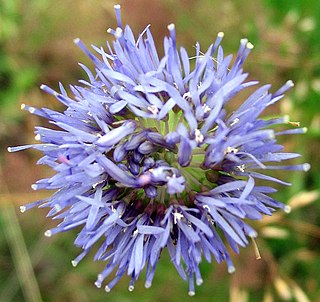
Jasione is a genus of flowering plants within the family Campanulaceae which are native to Europe.
Prosopis laevigata, commonly known as smooth mesquite, is a species of flowering tree in the pea family, Fabaceae, that is native to Mexico, Bolivia, Peru, and northwestern Argentina. In Mexico, the species is found in the nation's the central highlands, the lowlands of southern Tamaulipas, and in parts of Oaxaca, Morelos, Puebla, and Chiapas. It grows on a variety of sites on hillslides, in depressions, and along floodplains. It has been spotted growing in the Middle East as well.

Balsamocarpon brevifolium, or algarrobilla, is a species of flowering plants in the legume family, Fabaceae. It belongs to the subfamily Caesalpinioideae and is found in Chile.
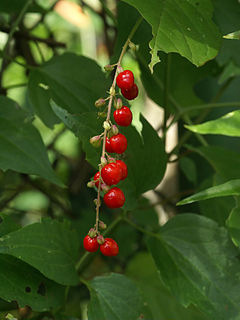
Rivina humilis is a species of flowering plant in the family Petiveriaceae. It was formerly placed in the pokeweed family, Phytolaccaceae. It can be found in the southern United States, the Caribbean, Central America, and tropical South America. Common names include pigeonberry, rougeplant, baby peppers, bloodberry, and coralito. The specific epithet means "dwarfish" or "lowly" in Latin, referring to the plant's short stature.
Algarrobilla, small carob (algarrobo) in Spanish, also written algarovilla, may refer to :
P. humilis may refer to:

Prosopis africana is a flowering plant species in the genus Prosopis found in Africa. Its common names include African mesquite, iron tree, gele (Malinke) or somb tree.
Xerocladia viridiramis is species of plant in the legume family (Fabaceae). It is the sole species in the monotypic genus Xerocladia.
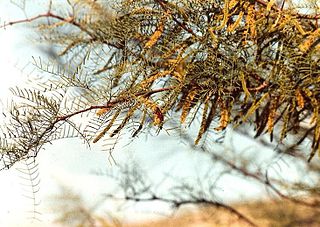
Prosopis chilensis is a species of tree in the genus Prosopis, belonging to the family Fabaceae. It is found in parts of central Chile, southern Peru, Bolivia, and Andean (northwestern) Argentina. Its common names include Chilean mesquite, cupesí, and Chilean algarrobo. It is used for providing shade, for animal feed and for firewood.
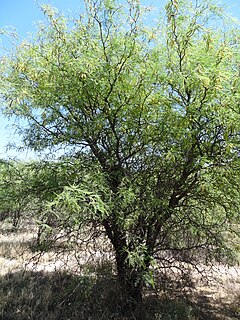
Prosopis flexuosa, commonly known as tortuous mesquite and a variety of Spanish vernacular names including algarrobo dulce and algarrobo negro, is a species of flowering tree in the genus Prosopis of the family Fabaceae. It is found in arid and semi-arid regions of Argentina, Bolivia and Chile, including the western Gran Chaco and the Monte Desert, where it is a conspicuous and characteristic plant of the region. Its timber is used for construction, charcoal and fuel and its fruits are eaten by humans and livestock.
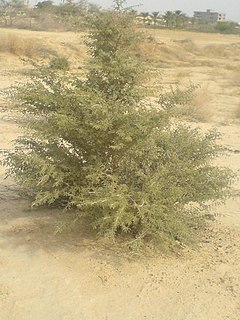
Prosopis koelziana Burkil is a species of the genus Prosopis.

Prosopis farcta, the Syrian mesquite, is a species of the genus Prosopis, growing in and around the Middle East.
References
- 1 2 The Legume Phylogeny Working Group (LPWG). (2017). "A new subfamily classification of the Leguminosae based on a taxonomically comprehensive phylogeny". Taxon . 66 (1): 44–77. doi: 10.12705/661.3 .